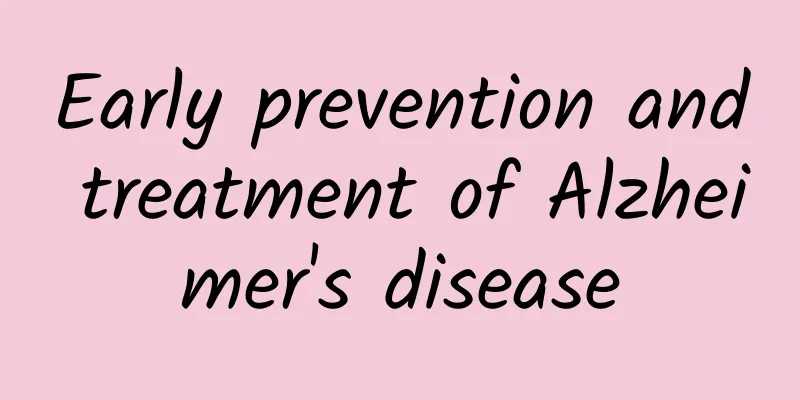Early prevention and treatment of Alzheimer's disease

|
More than 20 years before the onset of typical symptoms of Alzheimer's disease (AD), a series of pathophysiological changes occur in brain tissue. Mild cognitive impairment (MCI), also known as AD-induced MCI, that occurs during this process is the earliest stage with clinical symptoms. This stage becomes the most important window for early detection, diagnosis, and prevention of AD. Through history collection, physical examination, neuropsychological assessment, body fluid examination and imaging examination, AD-induced MCI can be diagnosed early and the following treatment plans can be started very early: Non-drug and drug treatments for AD-induced MCI 1. Recommendations for non-drug treatment: 1. Non-drug intervention is recommended for patients with AD-induced MCI, including cognitive training, moderate-intensity physical exercise, and a reasonable diet (such as the Mediterranean diet). 2. Repeated transcranial magnetic stimulation therapy helps improve patients' overall cognitive function, episodic memory and language function. 3. Computer-assisted cognitive training can serve as a useful supplement for intervention of AD-induced MCI. 4. Multimodal intervention consisting of multiple means such as diet, exercise, and cognitive training can improve or maintain the cognitive function of elderly people at high risk of AD in the population, and help delay the transformation of MCI to AD. 2. Recommendations for drug treatment: 1. The cholinesterase inhibitor donepezil can delay the progression of AD-induced MCI to AD in the early stages, but its long-term effects still need to be studied in more large-sample clinical trials. 2. Disease-modifying therapy with monoclonal antibodies targeting Aβ is likely to become an effective treatment for AD-induced MCI. 3. Drugs that reshape the balance of intestinal flora (such as sodium mannitol) can reduce peripheral related amino acid metabolites, alleviate brain neuroinflammation, improve cognitive function, and may have an improvement effect on AD-induced MCI. 4. Ginkgo leaf extract EGb761 improves AD cognitive function, but its effect on AD-induced MCI still requires large-sample clinical trials. 5. Patients with AD-derived MCI need to pay attention to emotional disorders (anxiety, depression, etc.) and deal with them in a timely manner, which may be beneficial in reducing the risk of MCI transforming into AD. Donepezil can delay the progression of AD-derived MCI with depression to AD. 6. Donepezil may be beneficial for patients with AD-induced MCI who have abnormal gait and are at risk of falling. 7. When using antipsychotic drugs to treat the neuropsychiatric symptoms of AD-induced MCI, the risk of causing cognitive decline must be weighed. ➤ Recommendations for medical staff and caregivers: 1. Medical staff should inform patients that combined intervention measures, including comprehensive management of risk factors, cognitive training, exercise therapy, home care, and social interaction therapy, are beneficial for preventing or delaying cognitive impairment. 2. Reasonable daily life care, environmental modification, care for caregivers and other measures are beneficial to improving the quality of life of patients and delaying the progression of cognitive impairment. ➤Prognosis and outcome recommendations: 1. The risk of AD-induced MCI patients converting to AD is significantly increased, and early diagnosis should be emphasized. 2. aMCI patients whose cognitive functions have returned to normal are still at risk of developing AD and require regular follow-up and evaluation (it is recommended to follow up and evaluate once every 3 to 6 months). 3. The application of biological markers (including body fluids and imaging) can more accurately assess the risk of AD-induced MCI patients converting to AD. Prevention of AD-induced MCI The prevention of AD-induced MCI is divided into primary prevention and secondary prevention. Primary prevention is to identify controllable risk factors for AD-induced MCI and reduce the risk to prevent the occurrence of MCI or the pathophysiological progression of AD-induced MCI; Secondary prevention is to detect pathological markers early and intervene in the preclinical stage of AD to prevent the transformation of MCI to AD. ➤ Recommendations: 1. Reasonable diet, regular physical and mental exercise, good sleep, blood pressure control, prevention and treatment of diabetes, cerebrovascular disease, atrial fibrillation, etc. are helpful in preventing AD-induced MCI. 2. Currently, there is no effective secondary prevention measure for AD-induced MCI. |
<<: Is it difficult to cooperate with MRI examination? Anesthesiologist can help you
Recommend
Meta: Threads currently has 275 million monthly active users
Meta recently said that its social network Thread...
What are the ways for women to improve their sexual function?
Sexual life is something that every adult of us w...
There is something on your nails that can ruin your health
Nowadays, many women love beauty. Of course, lovi...
What is the reason for women's yellow feet
In daily life, many people will suddenly find tha...
Why do people get colorectal cancer?
A large number of studies have shown that an unhe...
To make matters worse, why is Sange so miserable?
According to a report by the Global Times, as Ind...
What is the cause of excessive vaginal discharge and itching?
Most women have some gynecological diseases, and ...
Can I eat dragon fruit during my period?
Dragon fruit is a relatively common fruit. We can...
Can the leaves of Tiger Pilan be transplanted to survive? How to transplant Tiger Pilan to survive?
Tiger Piranha is very common in our daily life. B...
Bleeding again 15 days after menstruation
In our daily life, we often see women who bleed a...
Can I eat hot pot during early pregnancy?
Everyone loves the deliciousness of hot pot. Hot ...
Secretion cleanliness 3
The index of vaginal secretion cleanliness is the...
Right hand of a woman with a mole on the palm
Moles on the palm are quite common in daily life....
What causes the odor in women's private parts?
It is more common for women to have an odor in th...
Will allergies cause gynecological inflammation?
Allergies are allergies, and gynecological inflam...









